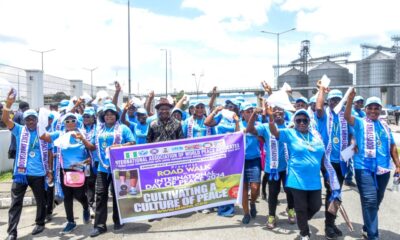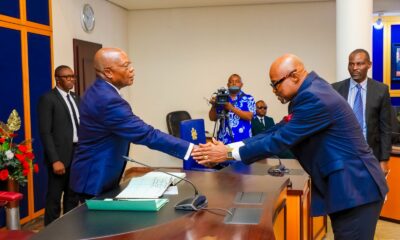News
Re-Drafted PIB Stirs Anxiety Among Oil Workers
Nigerian oil workers have criticised the redrafted Petroleum Industry Bill (PIB) packaged by the Federal Government for presentation to the National Assembly for approval early next year.
The new draft titled “Petroleum Industry Governance & Institutional Framework Bill 2015”, is for an Act to provide the governance and institutional framework for the petroleum industry and other related matters.
However, workers in three regulatory agencies in the petroleum industry, namely Department of Petroleum Resources (DPR), Petroleum Products Pricing Regulatory Agency (PPPRA) and Petroleum Equalization Fund (PEF), have raised concerns about the redrafted Bill not providing adequate accommodation for their interests and other oil workers.
Chairmen of the various agencies’ chapter of the Petroleum and Natural Gas Senior Staff Association of Nigeria (PENGASSAN) have petitioned the National Executive Council of the union to seek its “extreme urgent intervention” by meeting with the Minister of State for Petroleum Resources, Ibe Kachikwu, to discuss their concerns.
The petition, written under the aegis of “Regulators’ Forum” was signed by PENGASSAN Chairman, PPPRA Chapter, Victor Ononokpono, along with his DPR counterpart, Garba Bello, and their counterpart in PEF, Aminu Ahmed.
The concerns of workers in the three agencies bordered on observations the proposed law may have inadvertently left the oil workers in the lurch.
Although the trio commended the Minister’s effort to stimulate reforms in the industry after several failed attempts in the past, they noted some inconsistencies in the draft PIB, which have stirred some real fears about a veiled attempt by government to sack its members.
Specifically, the anxious workers drew attention to some of the inconsistencies in Part 3 of the bill, on the establishment of the Nigeria Petroleum Regulatory Commission (NPRC), Section 13, on the composition of its Board, and Section 87, on the transfer of staff.
The Bill provides that the Commission would combine the monitoring and regulatory roles and responsibilities of DPR and PPPRA to “administer and enforce policies, laws and regulations relating ti all aspects of petroleum operations.”
The oil workers are worried that the Bill was silent on the fate of an important agency like the PEF vested with the responsibility of ensuring uniform pricing of petroleum products in the country.
“The Union senses a subtle ploy to retrench or drop some of the work force transiting to the Nigeria Petroleum Regulatory Commission with the contentious clause on ‘transfer of certain employees,” the Forum noted.
“Cessation of employment and transfer of staff should be automatic and guaranteed as provided by the Public Service rules and Constitution of the Federal Republic of Nigeria.”
To show how unfriendly the redraft PIB was to Labour, the oil workers said the composition of the governing Board of the NPRC did not have a single representation from any arm of the organised labour.
This is a departure from the provisions of the original draft 2012 Bill. Part D, Section 47 (2) (f) and (g) on the Board of the Downstream Petroleum Regulatory Agency (DPRA), representatives of the two major oil workers unions, the National Union of Petroleum and Natural Gas Workers (NUPENG) and PENGASSAN were listed as members.
As the highest policy and administrative hierarchy of the petroleum industry, the redraft Bill listed the Governing Board to include, among others, representatives of the Ministries of Petroleum Resources, Finance and Environment.
A close scrutiny of the redraft Bill also revealed that neither the role nor status of PEF was specified, fuelling fears by its workers that government might be contemplating their sack, as there was equally no provision for neither their absorption nor transfer of service.
Equally, in the 2012 PIB, the establishment of PEF was included, to which any net surplus revenue recovered from petroleum products marketing companies should be paid.
Part F, section 101 (2) (e-h) also provided for representatives of the various affiliate oil workers’ groups and the labour unions, as members of the Board.
“Apart from the uncertainty of the agency’s institutional role, the draft Bill as currently drafted will create job loss, as no provision for absorption or transfer of service for the work force is contemplated,” the oil workers said.
“The Central Working Committee must make a public position known on the non-inclusion of organised labour in the composition of the governing Boards of Commission against international best practice.”
They asked the national unions to extract a memorandum of understanding on the re-drafting of the contentious issues, particularly as it concerned job loss of PENGASSAN members across the existing agencies (PEF, PPPRA and DPR.).
News
Tinubu Appoints Four Nominees Into NCDMB Governing Council

President Bola Tinubu has approved the nomination of four new members to the Governing Council of the Nigerian Content Development and Monitoring Board (NCDMB).
The Special Adviser to the President on Information and Strategy, Bayo Onanuga, in a statement yesterday, said the appointment is to fill existing vacancies and strengthen the board’s capacity.
The statement said the approved nominees are Mr. Olusegun Omosehin of the National Insurance Commission and Engr. Wole Ogunsanya of the Petroleum Technology Association of Nigeria.
Tinubu also endorsed the nomination of Sam Onyechi, who represents the Nigerian Content Consultative Forum and Barrister Owei Oyanbo from the Ministry of Petroleum Resources.
The President encouraged the new members to leverage their expertise and dedication to enhance local content development within Nigeria’s oil and gas industry.
It added, “The nominations arose from the exit of previous institutional representatives from the Governing Council.
“The NCDMB Governing Council, established under Section 69 of the Nigerian Oil and Gas Industry Content Development Act, 2010, comprises representatives from key institutions.
“These include the Ministry of Petroleum Resources, the Nigerian Upstream Petroleum Regulatory Commission, the Nigerian National Petroleum Company Limited, the Petroleum Technology Association of Nigeria, the Council for the Regulation of Engineering in Nigeria, the Nigerian Content Consultative Forum, and the National Insurance Commission.”
News
NDDC To Construct Hostels, Roads In UNIPORT – Ogbuku

The Niger Delta Development Commission (NDDC) has announced plans to construct additional hostels, rehabilitate roads, and enhance power supply in the University of Port Harcourt (UNIPORT).
NDDC’s Managing Director, Dr Samuel Ogbuku, disclosed this during a visit to the commission’s headquarters in Port Harcourt, yesterday by a delegation from the UNIPORT’s Governing Council.
Ogbuku stated that the NDDC had committed to upgrading facilities at UNIPORT as part of efforts to foster partnership with educational institutions across the Niger Delta.
According to him, the implementation of additional projects at the university forms part of a broader strategy to improve education standards in the region.
“Aside from the construction of new hostel blocks and installation of a 300 KVA solar inverter system, the NDDC will also facilitate more projects in the university.
“The commission will also deploy its engineers to assess the condition of UNIPORT’s roads and hostels for potential rehabilitation,” he said.
Ogbuku noted that upon completion, the projects would add to various initiatives previously undertaken by the commission at the university.
“These and other projects reflect our commitment to actualising President Bola Tinubu’s Renewed Hope Agenda in the Niger Delta region,” he added.
He reaffirmed the NDDC’s dedication to fostering development and strengthening partnerships across the region.
Earlier, Sen. Mao Ohuanbunwa, Chairman of UNIPORT’s Governing Council, who led the delegation commended the current leadership of the NDDC for its achievements in accelerating development in the Niger Delta.
He highlighted the university’s infrastructural challenges, noting that it lacked adequate facilities to accommodate its growing student population, and appealed for the NDDC’s support in addressing the shortfall.
“Currently, UNIPORT has a total student population of about 50,000, while its hostel accommodation capacity can only cater for 5,000 students.
“We therefore urge the NDDC to assist in the construction of additional hostels, improve transportation facilities, and facilitate the acquisition of gas turbines to enhance power supply for our students,” Ohuanbunwa pleaded.
The Vice Chancellor of UNIPORT, Prof. Owunari Georgewill, commended NDDC for its impactful projects across the Niger Delta and extended an invitation to the commission to participate in the institution’s forthcoming 50th anniversary celebrations.
News
Senate Rejects Motion To Rename INEC Headquarters After Humphrey Nwosu

The Senate has rejected a motion to rename the Independent National Electoral Commission (INEC) headquarters after the former chairman of the defunct National Electoral Commission, late Prof Humphrey Nwosu.
Nwosu presided over the June 12, 1993, presidential election, which was truncated by the former military President, General Ibrahim Babangida (rtd).
The election which was won by the late business mogul, Chief MKO Abiola, was adjudged to be the freest and fairest in the electoral history of Nigeria.
The motion to rename INEC after Nwosu was re-sponsored by Senator Enyinnaya Abaribe yesterday after lawmakers threw it out last Wednesday.
Abaribe called for posthumous national honours to be conferred on Nwosu in recognition of his role in Nigeria’s democratic evolution.
However, the proposal sparked a heated debate once again, with lawmakers deeply divided over Nwosu’s legacy.
Senator Osita Ngwu acknowledged that Nwosu operated under a military regime, which restricted his ability to announce the results.
He argued that “there was no way he would have announced the results with a gun to his head. That doesn’t change the fact that some of us see him as a hero.”
Senator Austin Akobundu, however, described it as most uncharitable for lawmakers to dismiss Nwosu’s contributions, insisting that he deserved a place in Nigeria’s hall of honour.
On the other hand, several senators like Senator Jimoh Ibrahim dismissed the idea outright, questioning why the Senate should honour someone who failed to announce the results insisting that “nothing should be named after him”.
Senator Cyril Fasuyi argued that history does not reward efforts, but only results.
“As long as he did not announce the result, whether under duress or not, I am against naming INEC headquarters after him,” he submitted.
Also, Senator Sunday Karimi criticised Nwosu for lacking the courage to speak out, while Senator Afolabi Salisu warned that immortalising him would undermine the memory of MKO Abiola, the widely accepted winner of the June 12, 1993, annulled election.
“Any attempt to do anything beyond a one-minute silence is to rubbish Abiola’s legacy,” he tendered.
After intense deliberation, most senators rejected the motion through a voice vote.
They, however, agreed to honour him with a one-minute silence and extend condolences to his family, effectively dismissing the other prayers to immortalise Nwosu.
-
News5 days ago
Senate Urges Communications Ministry To Review Data Costs
-
Politics5 days ago
Remain Steadfast, Peaceful, Group Tasks Women Over Rivers Crisis
-

 Politics5 days ago
Politics5 days agoReps Rescind Decision On Death Penalty, Immunity Clause
-
Business5 days ago
‘Tax Reform’ll Eliminate Regulatory Bottlenecks, Boost MSMEs Growth’
-
Nation5 days ago
Military Committed To Supporting Sustainable Food Security In Nigeria – CDS
-

 News5 days ago
News5 days agoRivers HoS Resigns As Ibas Appoints New SSG
-
Politics5 days ago
PDP Govs Congratulate Jonathan Over Sunhak Peace Prize
-

 Featured5 days ago
Featured5 days agoBring Your Wealth Of Experience To Governance, Ibas Tasks New SSG

